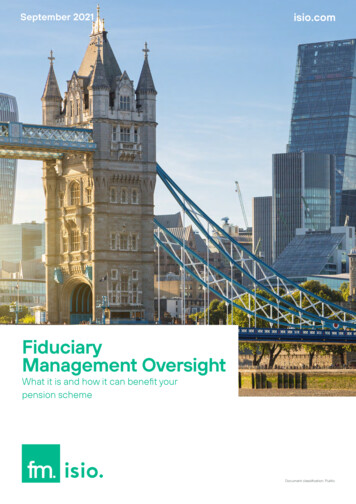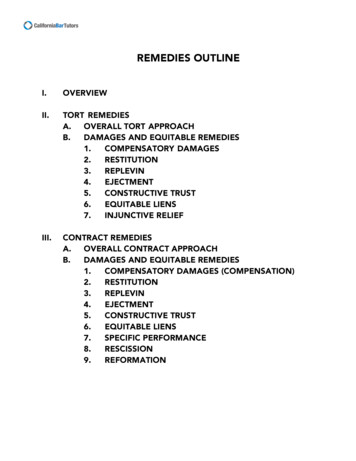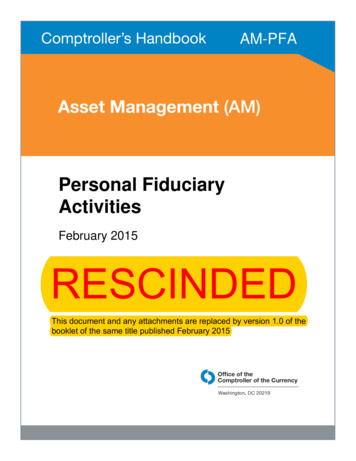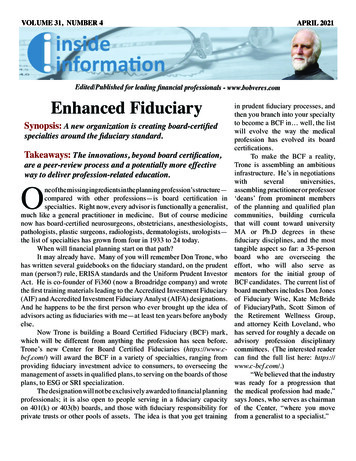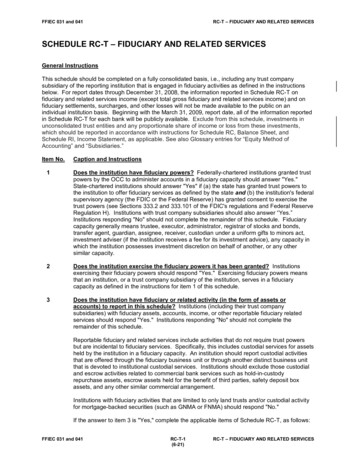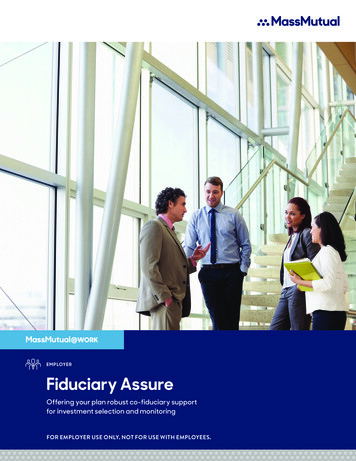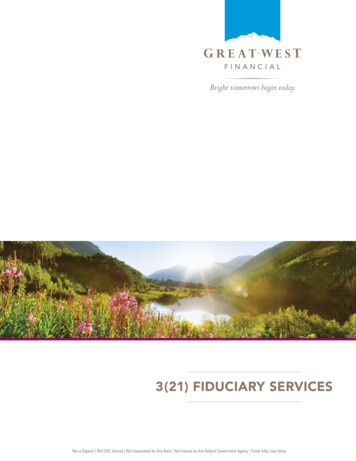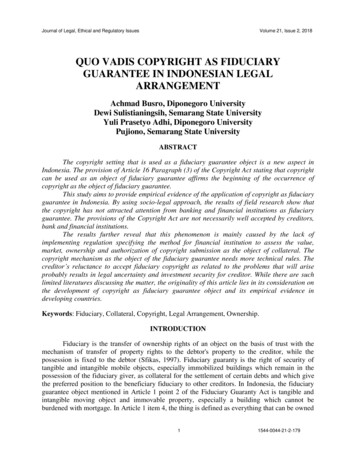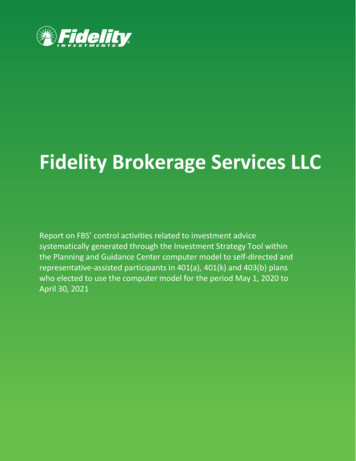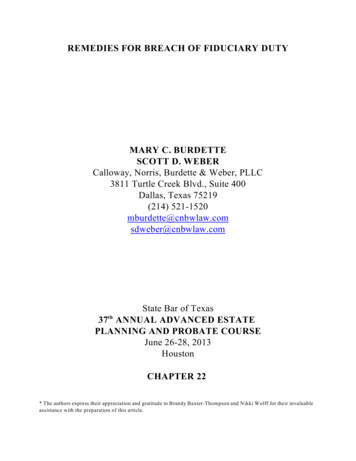
Transcription
REMEDIES FOR BREACH OF FIDUCIARY DUTYMARY C. BURDETTESCOTT D. WEBERCalloway, Norris, Burdette & Weber, PLLC3811 Turtle Creek Blvd., Suite 400Dallas, Texas 75219(214) ate Bar of Texas37 ANNUAL ADVANCED ESTATEPLANNING AND PROBATE COURSEJune 26-28, 2013HoustonthCHAPTER 22* The authors express their appreciation and gratitude to Brandy Baxter-Thompson and Nikki W olff for their invaluableassistance with the preparation of this article.
MARY C. BURDETTECalloway, Norris, Burdette & Weber, PLLC3811 Turtle Creek Boulevard, Suite 400Dallas, Texas 75219214-521-1520214-521-2201 Faxwww.cnbwlaw.comemail:mburdette@cnbwlaw.comAREAS OF PRACTICEProbate, Trust and Fiduciary Litigation; Estate Administration; Guardianships, including ContestedGuardianships; and Wills and TrustsEDUCATIONJuris Doctor Degree, cum laude, from Southern Methodist University School of Law 1982; Phi DeltaPhi scholastic honorary fraternity; Order of the Coif; Notes and Comments Editor, Southwestern LawReviewBachelor of Science Degree in Accounting, summa cum laude, from the University of Texas at Dallas1978PROFESSIONAL HISTORYAdmitted to the State Bar of Texas by the Supreme Court of Texas, November 1982Calloway, Norris, Burdette & Weber, PLLC, Partner from 1994 to presentThompson & Knight, Tax and Estate Section, 1982-1994 (Shareholder from 1987)Board Certified Estate Planning and Probate Law - Texas Board of Legal SpecializationBoard Certified Tax Law - Texas Board of Legal SpecializationCertified Public AccountantChair of Probate, Estates & Trust Section, Dallas Bar Association 2003-2004Council Member, Real Estate Probate & Trust Law Section, State Bar of Texas 2004-2008Fellow, American College of Trust and Estate Counsel
Member, Texas Board of Legal Specialization Estate Planning and Probate Law Legal AssistantExam Commission (1999-2004)Certified by the State Bar of Texas Under Probate Code Section 646 to serve as an Ad Litem inGuardianship ProceedingsNamed “Texas Super Lawyer” by Texas Monthly magazine since 2002Listed in “The Best Lawyers in America” since 2001Frequent speaker on matters involving probate, trusts, fiduciary law, guardianships and probatelitigation. List of speeches/articles is attached.Member, Dallas Bar Association, Probate, Trusts & Estates SectionMember, State Bar of Texas, Real Estate, Probate & Trust Law SectionAV Rated by Martindale-Hubbell Bar Register of Preeminent Women Lawyers, 2012
SCOTT D. WEBERCALLOWAY, NORRIS, BURDETTE & WEBER, PLLC400 Turtle Creek Centre3811 Turtle Creek Blvd.Dallas, Texas 75219(214) 521-1520 Telephone(214) 521-2201 E AREAS: Contested probate matters, guardianships, trust, estate, and other fiduciary litigation.EDUCATION:Southern Methodist University, Dallas, Texas, J.D., 1989Columbia University, New York, New York, B.A., History, 1986LICENSES:State Bar of Texas – 1989United States Supreme CourtUnited States Court of Appeals for the Fifth CircuitUnited States District Court for the four Districts of TexasUnited States Tax CourtCERTIFICATION:Board Certified Civil Trial Law – Texas Board of Legal Specialization, 2006.HONORS:Named a “Texas Super Lawyer” in the area of Trust & Estate Litigation by TexasMonthly magazine since 2006.Included in “The Best Lawyers In America” for Litigation – Trusts and Estates, since2008.BAR ACTIVITIES:Dallas Bar Association, Estate Planning and Probate Section, Council Member 2010.
SCOTT D. WEBER is a trial lawyer and a member of Calloway, Norris, Burdette& Weber, PLLC, in Dallas, Texas. Scott’s practice involves contested probate and fiduciarylitigation. Scott grew up in Dallas, Texas, attended Woodrow Wilson High School, receiveda B.A. in history from Columbia University in 1986, and a J.D. from Southern MethodistUniversity in 1989. He was admitted to the Texas Bar in 1989. Scott is also admitted topractice before all of the Federal Courts in Texas, the United States Court of Appeals for theFifth Circuit, the United States Supreme Court, and the United States Tax Court. In 2006he became Board Certified in Civil Trial Law by the Texas Board of Legal Specialization.Scott has been named a “Texas Super Lawyer” by Texas Monthly Magazine since 2006, andhas been listed in Best Lawyers in America since 2008. He has been an adjunct professor ofTrial Advocacy at Southern Methodist University’s Dedman School of Law. Scott is activein the Dallas Bar Association and other non-profit organizations, such as the SouthwesternDiabetic Foundation, for which he serves as a member of its Executive Board.
Remedies for Breach of Fiduciary DutyChapter 22TABLE OF CONTENTSI.INTRODUCTION. . . . . . . . . . . . . . . . . . . . . . . . . . . . . . . . . . . . . . . . . . . . . . . . . . . . . . . . . . . . . . 1II.FIDUCIARY DUTIES. . . . . . . . . . . . . . . . . . . . . . . . . . . . . . . . . . . . . . . . . . . . . . . . . . . . . . . . . . .A.Duty of Loyalty. . . . . . . . . . . . . . . . . . . . . . . . . . . . . . . . . . . . . . . . . . . . . . . . . . . . . . . . . .B.Duty of Competence. . . . . . . . . . . . . . . . . . . . . . . . . . . . . . . . . . . . . . . . . . . . . . . . . . . . . .1.Duty to Comply With the Prudent Investor Rule. . . . . . . . . . . . . . . . . . . . . . . . . .2.Duty Not to Delegate. . . . . . . . . . . . . . . . . . . . . . . . . . . . . . . . . . . . . . . . . . . . . . .3.Duty to Keep and Render Accounts. . . . . . . . . . . . . . . . . . . . . . . . . . . . . . . . . . . .4.Duties at Inception of Trusteeship. . . . . . . . . . . . . . . . . . . . . . . . . . . . . . . . . . . . .5.Duty to Exercise Reasonably Care and Skill. . . . . . . . . . . . . . . . . . . . . . . . . . . . .6.Duty to Take and Retain Control of Trust Property. . . . . . . . . . . . . . . . . . . . . . . .7.Duty to Preserve Trust Property. . . . . . . . . . . . . . . . . . . . . . . . . . . . . . . . . . . . . . .8.Duty to Enforce Claims. . . . . . . . . . . . . . . . . . . . . . . . . . . . . . . . . . . . . . . . . . . . .9.Duty to Defend. . . . . . . . . . . . . . . . . . . . . . . . . . . . . . . . . . . . . . . . . . . . . . . . . . . .10.Duty Not to Co-Mingle Trust Funds. . . . . . . . . . . . . . . . . . . . . . . . . . . . . . . . . . .11.Duty With Respect to Bank Deposits. . . . . . . . . . . . . . . . . . . . . . . . . . . . . . . . . . .12.Duty With Respect to Co-Trustees. . . . . . . . . . . . . . . . . . . . . . . . . . . . . . . . . . . . .C.Duty of Full Disclosure. . . . . . . . . . . . . . . . . . . . . . . . . . . . . . . . . . . . . . . . . . . . . . . . . . . .D.Duty to Reasonably Exercise Discretion. . . . . . . . . . . . . . . . . . . . . . . . . . . . . . . . . . . . . . .1.Power to Adjust Between Principal and Income. . . . . . . . . . . . . . . . . . . . . . . . . .2.There is no “Absolute” Discretion. . . . . . . . . . . . . . . . . . . . . . . . . . . . . . . . . . . . .III.REMEDIES. . . . . . . . . . . . . . . . . . . . . . . . . . . . . . . . . . . . . . . . . . . . . . . . . . . . . . . . . . . . . . . . . . . 4A.Statutory Remedies. . . . . . . . . . . . . . . . . . . . . . . . . . . . . . . . . . . . . . . . . . . . . . . . . . . . . . . 41.Texas Trust Code. . . . . . . . . . . . . . . . . . . . . . . . . . . . . . . . . . . . . . . . . . . . . . . . . . 42.Texas Probate Code. . . . . . . . . . . . . . . . . . . . . . . . . . . . . . . . . . . . . . . . . . . . . . . . 4B.Parties. . . . . . . . . . . . . . . . . . . . . . . . . . . . . . . . . . . . . . . . . . . . . . . . . . . . . . . . . . . . . . . . . 41.Beneficiary. . . . . . . . . . . . . . . . . . . . . . . . . . . . . . . . . . . . . . . . . . . . . . . . . . . . . . . 42.Fiduciary. . . . . . . . . . . . . . . . . . . . . . . . . . . . . . . . . . . . . . . . . . . . . . . . . . . . . . . . . 43.Third Parties. . . . . . . . . . . . . . . . . . . . . . . . . . . . . . . . . . . . . . . . . . . . . . . . . . . . . . 5C.Damages. . . . . . . . . . . . . . . . . . . . . . . . . . . . . . . . . . . . . . . . . . . . . . . . . . . . . . . . . . . . . . . 51.Liability. . . . . . . . . . . . . . . . . . . . . . . . . . . . . . . . . . . . . . . . . . . . . . . . . . . . . . . . . 52.Elements. . . . . . . . . . . . . . . . . . . . . . . . . . . . . . . . . . . . . . . . . . . . . . . . . . . . . . . . . 53.Causation. . . . . . . . . . . . . . . . . . . . . . . . . . . . . . . . . . . . . . . . . . . . . . . . . . . . . . . . 54.Measure of damages. . . . . . . . . . . . . . . . . . . . . . . . . . . . . . . . . . . . . . . . . . . . . . . . 65.Collection by offset from trustee/beneficiary. . . . . . . . . . . . . . . . . . . . . . . . . . . . 8D.Constructive Trust. . . . . . . . . . . . . . . . . . . . . . . . . . . . . . . . . . . . . . . . . . . . . . . . . . . . . . . . 8E.Equitable Lien. . . . . . . . . . . . . . . . . . . . . . . . . . . . . . . . . . . . . . . . . . . . . . . . . . . . . . . . . . . 9F.Fee Forfeiture. . . . . . . . . . . . . . . . . . . . . . . . . . . . . . . . . . . . . . . . . . . . . . . . . . . . . . . . . . 10G.Profit Disgorgement. . . . . . . . . . . . . . . . . . . . . . . . . . . . . . . . . . . . . . . . . . . . . . . . . . . . . 10H.Exemplary Damages. . . . . . . . . . . . . . . . . . . . . . . . . . . . . . . . . . . . . . . . . . . . . . . . . . . . . 11I.Attorney Fees. . . . . . . . . . . . . . . . . . . . . . . . . . . . . . . . . . . . . . . . . . . . . . . . . . . . . . . . . . 121.Trust Code Section §114.064. . . . . . . . . . . . . . . . . . . . . . . . . . . . . . . . . . . . . . . . 122.Trust Code §113.151(a). . . . . . . . . . . . . . . . . . . . . . . . . . . . . . . . . . . . . . . . . . . . 123.Trustee Removed for Cause. . . . . . . . . . . . . . . . . . . . . . . . . . . . . . . . . . . . . . . . . 124.Probate Code Section 242. . . . . . . . . . . . . . . . . . . . . . . . . . . . . . . . . . . . . . . . . . 12-i-1111122222222222334
Remedies for Breach of Fiduciary Duty5.Probate Code §149C(c). . . . . . . . . . . . . . . . . . . . . . . . . . . . . . . . . . . . . . . . . . . .6.Litigation Due to Fiduciary’s Misconduct. . . . . . . . . . . . . . . . . . . . . . . . . . . . . .Removal. . . . . . . . . . . . . . . . . . . . . . . . . . . . . . . . . . . . . . . . . . . . . . . . . . . . . . . . . . . . . . .1.Removal of a Trustee. . . . . . . . . . . . . . . . . . . . . . . . . . . . . . . . . . . . . . . . . . . . . .2.Removal of an Independent Executor. . . . . . . . . . . . . . . . . . . . . . . . . . . . . . . . .Accountings. . . . . . . . . . . . . . . . . . . . . . . . . . . . . . . . . . . . . . . . . . . . . . . . . . . . . . . . . . . .1.Estate Accountings. . . . . . . . . . . . . . . . . . . . . . . . . . . . . . . . . . . . . . . . . . . . . . . .2.Trust Accountings. . . . . . . . . . . . . . . . . . . . . . . . . . . . . . . . . . . . . . . . . . . . . . . .3.Accounting from Agent Under POA. . . . . . . . . . . . . . . . . . . . . . . . . . . . . . . . . .Interim Remedies. . . . . . . . . . . . . . . . . . . . . . . . . . . . . . . . . . . . . . . . . . . . . . . . . . . . . . . .1.Temporary Restraining Order/Temporary Injunction. . . . . . . . . . . . . . . . . . . . .2.Receiver. . . . . . . . . . . . . . . . . . . . . . . . . . . . . . . . . . . . . . . . . . . . . . . . . . . . . . . .3.Auditor. . . . . . . . . . . . . . . . . . . . . . . . . . . . . . . . . . . . . . . . . . . . . . . . . . . . . . . . .13131313131616161717171919USE OF EXPERTS. . . . . . . . . . . . . . . . . . . . . . . . . . . . . . . . . . . . . . . . . . . . . . . . . . . . . . . . . . . .A.Standards for Admissibility of Expert Testimony. . . . . . . . . . . . . . . . . . . . . . . . . . . . . . .B.About What Can an Expert Witness Testify. . . . . . . . . . . . . . . . . . . . . . . . . . . . . . . . . . .C.Factors to Consider When Selecting and Using Expert Witnesses. . . . . . . . . . . . . . . . . .D.The use of Expert Witnesses in Fiduciary Litigation. . . . . . . . . . . . . . . . . . . . . . . . . . . .2020212222J.K.L.IV.Chapter 22-ii-
Remedies for Breach of Fiduciary DutyREMEDIES FORFIDUCIARY DUTYBREACHChapter 22The duty of loyalty includes the duty not to“self-deal.” A trustee who benefits personally fromutilizing or dealing with trust property is considered tobe “self-dealing.” Any self-dealing by a fiduciary willgive rise to a “presumption of unfairness,” and theburden of proving the fairness of the transaction isplaced on the fiduciary. Tex. Bank & Trust Co. v.Moore, 595 S.W.2d 502 (Tex. 1980); Pace v. McEwen,574 S.W.2d 792 (Tex. Civ. App.—San Antonio 1978,writ ref’d n.r.e.); Jochec v. Clayburne, 863 S.W.2d 516(Tex. App.—Austin 1993, writ denied).OFI.INTRODUCTIONFiduciary duties are the highest duties known tothe law. Nathan v. Hudson, 376 S.W.2d 856, 860–61(Tex. Civ. App.—Dallas 1964, writ ref’d n.r.e.). TexasCourts hold trustees to a “very high and very strictstandard of conduct which equity demands.” Slay v.Burnett’s Trust, 187 S.W.2d 377, 387–88 (Tex. 1945).A trustee consents to have his conduct “measured by thestandards of the finer loyalties exacted by courts ofequity. That is a sound rule and should not be whittleddown by exceptions. Johnson v. Peckham, 132 Tex. 148,120 S.W.2d 786 (Tex. 1938). See also Geeslin v.McElhenney, 788 S.W.2d 683, 685 (Tex. App.—Austin1990, no writ); G. T. BOGERT , Trust & Trustees § 544(2d rev. ed. 1993). Due to the extremely high duties andstandard of care imposed on fiduciaries, the courts haveapplied broad, flexible remedies to protect beneficiaries.The various remedies available for a fiduciary’s breachof its duties are designed to put beneficiaries in the sameposition they would have been in if no breach had beencommitted and to charge the fiduciary with any loss andgive the trust any gain resulting from a breach offiduciary duty.Texas Trust Code Section 117.007 expresslyprovides that a trustee shall invest and manage the trustassets solely in the interest of the beneficiaries.Section 117.008 expressly requires a trustee toact impartially in investing and managing trust assets ifthe trust has two or more beneficiaries, taking intoaccount any differing interests of the beneficiaries. Seealso WILLIAM F. FRATCHER , Scott on Trusts § 183 (4thed. 1987); RESTATEM ENT (SECOND ) OF TRUSTS § 183.B.Duty of CompetenceThe Trustee has an affirmative duty toadminister the trust. TEX . TRUST CODE §§113.006,113.051. The fundamental duties of a trustee include theuse of the skill and prudence which an ordinary, capableand careful person would use in the conduct of his ownaffairs. Interfirst Bank Dallas, N.A. v. Risser, 739S.W.2d 882, 888 (Tex. App.—Texarkana 1987, no writ).The duty of competence encompasses many “subduties,” some of which are described below.II.FIDUCIARY DUTIESThere are three sources of fiduciary duties: thetrust instrument, the Texas Trust Code, and the commonlaw, in that order. Texas Trust Code Section 113.051provides that the trustee shall “administer the trustaccording to its terms and [the Texas Trust Code]. In theabsence of any contrary terms of the trust instrument orcontrary provisions of [the Texas Trust Code], inadministering the trust the trustee shall perform all of theduties imposed on the trustees by the common law.”Case law has categorized fiduciary duties in variousways, but they generally, fall into the four maincategories listed below.1.Duty to Comply With the Prudent Investor RuleTexas Trust Code Section 117.003 provides thata trustee owes a duty to the beneficiaries of the trust tocomply with the prudent investment rule, unless alteredby the provisions of the trust. The standard of care forthe prudent investor is stated in Trust Code Section117.004 and requires a trustee to invest and manage trustassets as a prudent investor would, by considering thepurposes, terms, distribution requirements, and othercircumstances of the trust. In satisfying this standard,the trustee shall exercise reasonable care, skill, andcaution. A trustee’s investment decisions regardingindividual assets must be evaluated in the context of thetrust portfolio as a whole and as part of an overallstrategy having risk and return objectives reasonablysuited to the trust.A.Duty of LoyaltyThe duty of loyalty is the hallmark of a fiduciaryrelationship. The trustee must at all times place theinterests of the beneficiary above his own. Slay v.Burnett Trust, 187 S.W.2d 377 (Tex. 1945). The trusteeis not permitted to "place himself in a position where itwould be for his own benefit to violate his duty to thebeneficiaries." WILLIAM F. FRATCHER , Scott on Trusts§ 170 (4th ed. 1987); RESTATEM ENT (SECOND ) OF TRUSTS§ 170.2.Duty Not to DelegateThe trustee is generally obligated to personallyadminister the trust and cannot delegate to others acts1
Remedies for Breach of Fiduciary DutyChapter 22that the trustee should personally perform. See WILLIAMF. FRATCHER , Scott on Trusts § 171 (4th ed. 1987);RESTATEM ENT (SECOND ) OF TRUSTS § 171. There areexceptions to this rule. A trustee may employ attorneys,accountants, agents, including investment agents, andbrokers reasonable necessary in the administration of thetrust estate. TEX . TRUST CODE § 113.018. A trustee alsomay delegate investment decisions under certaincircumstances. TEX . TRUST CODE §117.001.9.Duty to DefendThe trustee is under a duty to do what isreasonable, under the circumstances, to defend actionsby third parties against the trust estate. See WILLIAM F.FRATCHER , supra § 178; RESTATEMENT (SECOND ) OFTRUSTS § 178.10.Duty Not to Co-Mingle Trust FundsThe trustee has a duty to keep trust propertyseparate from other property, and to properly designateit as trust property. Not only is it the trustee's duty tokeep the trust property separate from the trustee's ownproperty, but also to keep that property separate fromother trusts the trustee may administer. See WILLIAM F.FRATCHER , supra § 179; RESTATEM ENT (SECOND ) OFTRUSTS § 179. Joint investments may be proper, buteach trust's interest must be kept separate.3.Duty to Keep and Render AccountsA trustee is under a duty to the beneficiaries ofa trust to keep full accounts of the trust estate that areclear and accurate. WILLIAM F. FRATCHER , Scott onTrusts § 172 (4th ed. 1987); RESTATEM ENT (SECOND ) OFTRUSTS § 172. A beneficiary may demand a writtenstatement of accounts covering the trust's transactions.TEX . TRUST CODE §113.151.11.Duty With Respect to Bank DepositsAlthough a trustee may deposit funds in a bank,he is under a duty to use reasonable care in selecting thebank and to properly designate the deposit as a trustdeposit. He may not subject the deposit to unreasonablerestrictions on withdrawal or leave the property in noninterest bearing accounts for unduly long periods of time.See WILLIAM F. FRATCHER , supra § 180; RESTATEM ENT(SECOND ) OF TRUSTS § 180. See also Section 113.007 ofthe Texas Trust Code, which authorizes the trustee todeposit trust funds that are “being held pendinginvestment, distribution, or the payment of debts in abank that is subject to supervision by state or federalauthorities.”4.Duties at Inception of TrusteeshipWithin a reasonable time after receiving trustassets, a trustee shall review the trust assets andimplement decisions concerning the retention anddisposition of assets, in order to bring the trust portfoliointo compliance with the purposes, terms, distributionrequirements and other circumstances of the trust, andthe Texas Trust Code. TEX . TRUST CODE §117.006.5.Duty to Exercise Reasonable Care and SkillFor matters other than investments, "a trustee isunder a duty in administering the trust to exercise suchcare and skill as a man of ordinary prudence wouldexercise in dealing with his own property." SeeWILLIAM F. FRATCHER , Scott on Trusts § 174 (4th ed.1987); RESTATEM ENT (SECOND ) OF TRUSTS § 174.12.6.Duty to Take and Retain Control of TrustPropertyThe trustee is under a duty to take all reasonablesteps to obtain and control the trust property. SeeWILLIAM F. FRATCHER , supra § 175; RESTATEM ENT(SECOND ) OF TRUSTS § 175.Duty With Respect to Co-TrusteesUnless the trust provides otherwise, all trusteesare under a duty to participate in the trust administration.Therefore, a trustee cannot properly delegate the actsrequired of the trustee to co-trustees. It is also the dutyof a trustee to use reasonable care to prevent othertrustees from committing a breach of trust. See WILLIAMF. FRATCHER , supra § 184; RESTATEM ENT (SECOND ) OFTRUSTS §184.7.C.Duty to Preserve Trust PropertyA trustee must use the same care and skill that aperson of ordinary prudence would use to preserve trustproperty. WILLIAM F. FRATCHER , supra § 176;RESTATEM ENT (SECOND ) OF TRUSTS § 176.Duty of Full DisclosureA fiduciary has an affirmative duty to make afull and accurate disclosure of all material factsnecessary for the beneficiaries to protect their interests.Huie v. DeShazo, 922 S.W.2d 920 (Tex. 1996);Montgomery v. Kennedy, 669 S.W.2d 309 (Tex. 1984);Kinszbach Tool Co. Inc. v. Corbett-Wallace Corp., 160S.W.2d 509 (Tex. 1942). The rationale for this rule isdescribed in WILLIAM F. FRATCHER , supra § 173:8.Duty to Enforce ClaimsA trustee is under a duty to take reasonableactions to collect claims that are due to the trust estate.See WILLIAM F. FRATCHER , supra § 177; RESTATEM ENT(SECOND ) OF TRUSTS § 177.2
Remedies for Breach of Fiduciary DutyChapter 22The trustee is under a duty to thebeneficiaries to give them on theirrequest at reasonable times completeand accurate information as to theadministration of the trust.Thebeneficiaries are entitled to know whatthe trust property is and how the trusteehas dealt with it. They are entitled toexamine the trust property and theaccounts and vouchers and otherdocuments relating to the trust and itsadministration. Where a trustee iscreated for several beneficiaries, each ofthem is entitled to information as to thetrust. Where the trust is created in favorof successive beneficiaries, abeneficiary who has a future interestunder the trust, as well as a beneficiarywho is presently entitled to receiveincome, is entitled to such information,whether his interest is vested orcontingent.impartially, based on what is fair and reasonable to all ofthe beneficiaries, except to the extent that the terms ofthe trust or the will clearly manifest an intention that thefiduciary shall or may favor one or more of thebeneficiaries. A determination in accordance with thischapter is presumed to be fair and reasonable to all of thebeneficiaries.” TEX . TRUST CODE §116.004(b).A trustee has a fiduciary duty, upon demand bythe beneficiary, to furnish the beneficiaries with a formaltrust accounting; to inform a beneficiary of the natureand amount of the trust property, the trustee’smanagement actions, and the intent of the trusteeregarding the future administration of the trust estate;and to allow the beneficiary to inspect the books andrecords of the trust. Shannon v. First Nat’l Bank, 533S.W.2d 389 (Tex. Civ. App.—San Antonio 1976, writref’d n.r.e.); WILLIAM F. FRATCHER , supra § 173;RESTATEM ENT (SECOND ) OF TRUSTS §173. The fiduciaryduty of full disclosure operates before and after litigationhas been filed and is probably in addition to anyobligations of disclosure imposed by the “discovery”provisions of the Texas Rules of Civil Procedure. Huiev. DeShazo, 922 S.W.2d 920 (Tex. 1996); In re Peterson,2004 WL 88872 (Tex. App.—Amarillo)(mem. op.)(No.07-03-0512-CV)(not designated for publication).Trust Code Section 116.006 provides that a courtmay not question a trustee’s exercise or non-exercise ofthe power to adjust unless the court determines that thedecision was an abuse of the trustee’s discretion. If acourt determines that a trustee has abused its discretion,the court may place the income and remainderbeneficiaries in the positions that they would haveoccupied if the discretion had not been abused. TEX .TRUST CODE §116.006(c). If the trustee reasonablybelieves that one or more beneficiaries will object to theexercise of a discretionary power, the trustee maypetition the court to determine whether the proposeddiscretionary act will result in an abuse of the trustee’sdiscretion. TEX . TRUST CODE §116.006(d). In such asuit, the trustee is directed to advance from the trustprincipal all costs incident to the judicial determination,including attorney’s fees of the trustee, any beneficiarywho is a party and any guardian ad litem. At theconclusion of the proceeding, however, the court mayaward costs and attorney’s fees as the court deems to be“equitable and just” as provided in Trust Code Section114.064, including awarding costs against the trust, abeneficiary and/or the trustee in its individual capacity ifthe court determines that the trustee’s exercise of thediscretionary power would have resulted in an abuse ofdiscretion or that the trustee did not have reasonablegrounds for believing that a beneficiary would object.1.Power to Adjust Between Principal and Income.Trust Code Section 116.005 authorizes a trusteeto adjust between principal and income if the trustee isin compliance with the prudent investor rule, the trustprovides for distributions to a beneficiary by reference tothe trust’s “income” and the trustee cannot otherwiseadminister the trust impartially, based on what is fair andreasonable to all of the beneficiaries. The power toadjust specifically includes the power to allocate all orpart of a capital gain to trust income. This section listsnine factors that a trustee may consider in decidingwhether or how to exercise the power to adjust andprohibits a trustee from making an adjustment undercertain circumstances.D.Duty to Reasonably Exercise DiscretionA trustee must exercise a discretionary power“reasonably.” See Sassen v. Tanglegrove TownhouseCondo. Assoc., 877 S.W.2d 489 (Tex. App.—Texarkana1994, writ denied). Effective January 1, 2004, Texasenacted the Uniform Principal and Income Act. FormerTrust Code Sections 113.101 through 113.111 have beenrepealed. The Uniform Principal and Income Act iscontained in Chapter 116 of the Texas Trust Code. Inexercising a discretionary power of administrationregarding a matter covered by the Uniform Principal andIncome Act, “a fiduciary shall administer a trust or estateThe remaining sections of the Uniform Principaland Income Act generally provide for allocation of3
Remedies for Breach of Fiduciary DutyChapter 22specific receipts and disbursements between income andprincipal.k.2.There is no “Absolute” Discretion.Regardless of the language used in a trustinstrument, a trustee’s exercise of discretion in theperformance of his duties is always subject to review byTexas courts under an “abuse of discretion” standard.Corpus Christi Bank & Trust v. Roberts, 597 S.W.2d752, 754 (Tex. 1980).l.trace trust property of which the trusteewrongfully disposed and recover theproperty or proceeds from the property;orany other appropriate relief.The rules and procedures to pursue these remedies arecontained in the Texas Trust Code, other statutes, orcommon law, and are discussed further below.2.Texas Probate CodeAn executor or administrator holds the estate intrust for the beneficiaries or heirs, and is held to the samefiduciary standards that apply to all trustees. TEX . PROB .CODE § 37; Humane Society of Austin & Travis Countyv. Austin Nat’l Bank, 531 S.W.2d 574 (Tex. 1975), cert.denied, 425 U.S. 976 (1976). Thus, the remedies for atrustee’s breach of fiduciary duty should be available forclaims against an executor or administration, subject tothe limitations on the judicial supervision of anindependent executor under Probate Code Section145(h). TEX . PROB . CODE § 145(h) (“as long as theestate is represented by an independent executor, furtheraction of any nature shall not be had in the [court] exceptwhere this code specifically and explicitly provides forsuch action in the [court]”).III.Remedies for Breach of Fiduciary DutiesVarious remedies for breach of fiduciary dutyare available to obtain recovery for a specific beneficiaryor for the trust as a whole, or to protect the trust and theinterests of the beneficiaries. Although the beneficiarycannot obtain a double recovery, several remediesagainst the fiduciary may be available. For example, abeneficiary may obtain an accounting, damages from thetrustee for a breach of trust, removal of the trustee, anddenial of his compensation, or the beneficiary mayobtain a constructive trust over property and also recovermoney damages to satisfy the balance of a breach offiduciary duty claim. The beneficiary’s choice amongremedies will depend upon various factors, including theavailability of trust property for recovery, the value suchproperty, the applicable measure of damages, and thefiduciary’s ability to pay damages.A.The Probate Code provides the followingremedies for a breach of fiduciary duty by anindependent executor.Statutory Remedies1.Texas Trust Code.Section 114.008 specifies the following remediesavailable to a court when a breach of trust has occurred:a.b.c.d.e.f.g.h.i.j.a.b.compel the trustee to perform thetrustee’s duty or duties;enjoin the trustee from committing abreach of trust;compel the trustee to redress a breach oftrust, including compelling the trustee topay money or restore property;order a trustee to account;appoint a receiver to take possession ofthe trust property and administer thetrust;suspend the trustee;remove the trustee as provided underSection 113.082;reduce or deny compensation to thetrustee;void an act of the trustee;impose a lien or constructive trust ontrust property;c.d.B.Request bond for independent executor.TEX . PROB . CODE § 149.Demand and compel an estateaccounting after 15 months. TEX . PROB .CODE § 149A.Compel distribution of estate assetsafter 2 years. TEX . PROB . CODE § 149B.Seek removal of independent executor.TEX . PROB . CODE § 149C.Parties1.BeneficiaryA beneficiary may h
Guardianships; and Wills and Trusts EDUCATION Juris Doctor Degree, cum laude, from Southern Methodist University School of Law 1982; Phi Delta . Chair of Probate, Estates & Trust Section, Dallas Bar Association 2003-2004 Council Member, Real Estate Probate & Trust Law Section, State Bar of Texas 2004-2008 .
